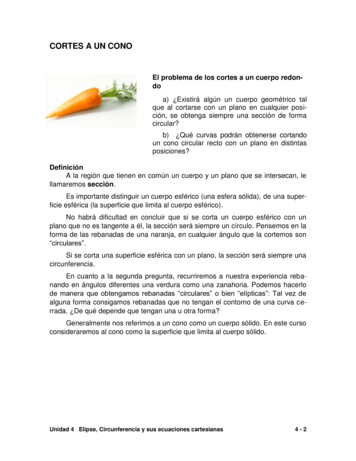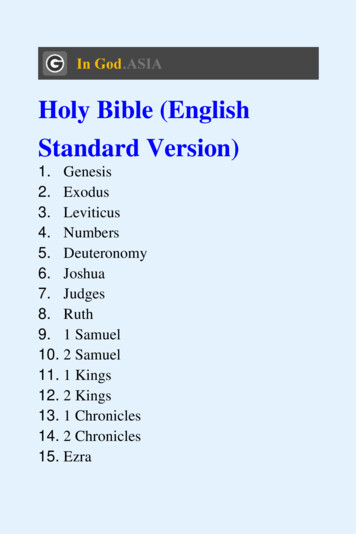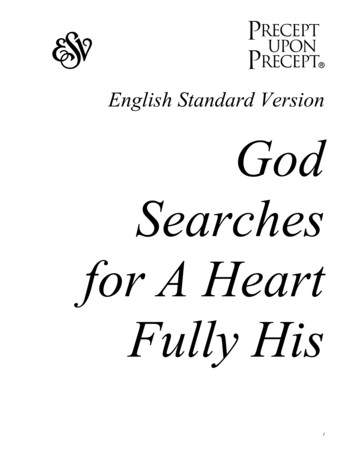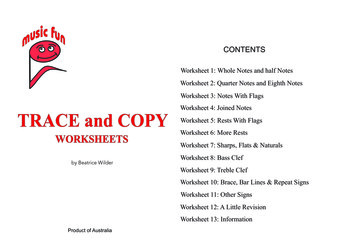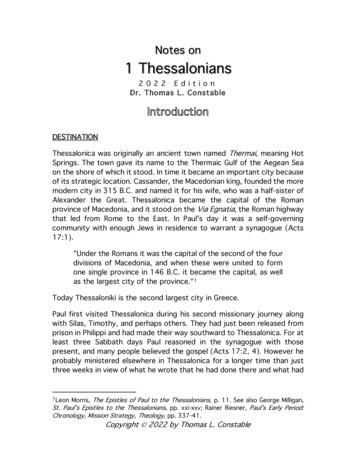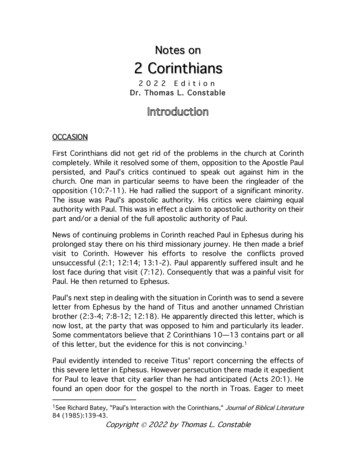
Transcription
Notes on1 Chronicles2 0 2 2 E d i t i o nDr. Thomas L. ConstableTITLEThe earliest Hebrew title for the Books of Chronicles translates as: "TheThings Left Behind." This name describes Chronicles as containingremnants of the monarchy history not recorded in the preceding OldTestament historical books. A later title that appears in most copies of theHebrew Bible is: "The Accounts of the Days," or "Daily Matters." This titleemphasizes the nature of Chronicles as official annals (cf. Esth. 2:23; 1Kings 14:19). Chronicles contains the official records of Israel's kings,especially David, Solomon, and those of the Southern Kingdom after theUnited Kingdom split. The English title "Chronicles" comes down to us fromJerome's statement that the books contained "the chronicle of the wholeof sacred history."1 As such, the title of this book describes its genre (typeof literature), which is a rare thing among Old Testament books.2As was true of the Books of Samuel and Kings, the Septuagint (Greek)translation of the Hebrew Bible (our Old Testament) was responsible fordividing the single Book of Chronicles into 1 and 2 Chronicles.3 Scribesdivided these long books to make them easier for copyists and readers tohandle. We could translate the Septuagint title as: "Things Omitted." Thistitle implies that Chronicles contains material left out of other inspiredhistories of Israel. This is true, but it also contains much material that theformer historical books included.1Quotedin Tremper Longman III and Raymond B. Dillard, An Introduction to the OldTestament, p. 190. The church father Jerome lived from A.D. 347 to about 420.2Sara Japhet, I & II Chronicles, p. 1.3The Septuagint translation was made in the third century B.C.Copyright Ó 2022 by Thomas L. Constable
2Dr. Constable's Notes on 1 Chronicles2022 Edition" fully 50 percent, of 1 & 2 Chronicles is the same materialfound in 1 & 2 Samuel and 1 & 2 Kings."1WRITER AND DATEEarly Jewish tradition recorded in the Babylonian Talmud ascribed theauthorship of Chronicles to Ezra and Nehemiah.2 Modern studies of thelinguistic differences that exist between the Books of Ezra, Nehemiah, andChronicles have led some scholars to reject this ancient view.3 Internalevidence suggests that if the writer was not Ezra and/or Nehemiah, he wasprobably a contemporary of these men. It is very common today to speakof the unknown writer as "the Chronicler."There is quite a bit of difference of opinion, even among conservativeevangelical scholars, regarding the date of composition. Most of them placeit within Ezra's lifetime (ca. 450-400 B.C.).4 This date would makeChronicles one of the last, if not the last, historical book of the OldTestament. In the Hebrew canon, 1 and 2 Chronicles conclude the thirdmajor section: the Writings, which also suggests that they were writtenlate. The date of composition of Ezra was probably about 446 B.C. TheBook of Nehemiah probably came into existence between 420 and 400 B.C.The date of writing of Esther was probably shortly after 473 B.C."It is now clear from comparison of Chronicles with theSamaritan Pentateuch and the Greek translations of the1DavidM. Howard Jr., An Introduction to the Old Testament Historical Books, p. 231. Seealso Eugene H. Merrill, "The Chronicler: What Kind of Historian Was He Anyway?"Bibliotheca Sacra 165:660 (October-December 2008):397-412.2Baba Bathra 15a. The Talmud is the ancient body of Jewish civil and ceremonial law andlegend comprising two parts: the Mishnah and the Gemara.3E.g., Sara Japhet, "The Supposed Common Authorship of Chronicles and Ezra-NehemiahInvestigated Anew," Vetus Testamentum 18 (1968):330-71; idem, I & II Chronicles, p. 4;Derek Kidner, Ezra and Nehemiah, pp. 136-39.4Cf. Bruce K. Waltke, "The Samaritan Pentateuch and the Text of the Old Testament," inNew Perspectives on the Old Testament, pp. 212-39; Eugene H. Merrill, "1 Chronicles," inThe Bible Knowledge Commentary: Old Testament, p. 589; Edward J. Young, AnIntroduction to the Old Testament, p. 413; Gleason L. Archer Jr., A Survey of OldTestament Introduction, p. 405; and J. Barton Payne, "First Chronicles," in The WycliffeBible Commentary, p. 367. See also John Bright, A History of Israel, p. 417.
2022 EditionDr. Constable's Notes on 1 Chronicles3Pentateuch that the text Chronicles used was more like thesetexts than the MT [Masoretic Text]."1Some scholars hold a date as early as the middle of the fifth century B.C.(450 B.C.), while others date Chronicles as late as 200 B.C.2"The best view is that Chronicles as a whole was in place by500 B.C., but that additions as late as the early fourth centurycontinued to be added, especially genealogies, under theinspiration of the Holy Spirit."3SCOPE AND PURPOSEChronicles covers a broader period of history than any other Old Testamentbook. In this it is similar to the Gospel of Luke, which also covers all ofhuman history from creation to the writer's day, though with less emphasison genealogies. Chronicles begins with Adam and ends with Anani, who livedeight generations after King Jehoiachin (1 Chron. 3:24). If we allow 25years for each generation, the birth of Anani would have been between 425and 400 B.C., assuming this genealogy is complete."In Near Eastern antiquity, the generation (that is the yearsbetween a man's birth and his begetting his first-born son) isordinarily 25 years or less."4Since the writer had great interest in David's family, it is unlikely that anyof David's descendants after Anani was known to him when he wrote thisbook. If they had been, the writer probably would have included theirnames.1J.A. Thompson, 1, 2 Chronicles, p. 23. The Hebrew Masoretic version of the Hebrew Bibledates from the sixth to the tenth centuries A.D., and it is the version of the Hebrew Biblethat is most used today.2For further discussion, see Archer, pp. 405-7; R. K. Harrison, Introduction to the OldTestament, pp. 1153-57, 1169-71; or any of the major commentaries.3Eugene H. Merrill, "1 Chronicles," in The Old Testament Explorer, pp. 294-95.4Frank M. Cross, "A Reconstruction of the Judean Restoration," Interpretation 29:2(1975):192-93.
4Dr. Constable's Notes on 1 Chronicles2022 EditionOther Old Testament books, especially Genesis, Samuel, and Kings, coverover half the material that Chronicles contains.1 There are two main reasonsfor this repetition: First, the writer wanted to give his readers anotherversion of those events. In this respect, Chronicles and the other historicalbooks are similar to the Gospels in the New Testament. Each gives a uniqueinterpretation and emphasis. Each writer selected the historical materialsthat would present what he wanted to emphasize. Chronicles is more similarto John's Gospel than the other Gospels. Both books are very sermonic,and each has a purpose that is easy to identify (John 20:30-31; 2 Chron.7:14). Chronicles is also similar to Deuteronomy, the last book of thePentateuch, which also preaches by recalling history.The second reason for the repetition of material in Chronicles is that thewriter wanted to explain and to expound the meaning of many events inIsrael's history, much like the writers of modern commentaries do. This wasespecially important because the original readers of Chronicles needed toremember their history and the spiritual issues that had molded and wouldmold their destiny. These observations would guide them as they soughtto reestablish Israel in the Promised Land after the Babylonian Captivity."The purpose of these two volumes [1 and 2 Chronicles] is toreview the history of Israel from the dawn of the human raceto the Babylonian captivity and Cyrus' edict of restoration.This review is composed with a very definite purpose in mind,to give to the Jews of the Second Commonwealth the truespiritual foundations of their theocracy as the covenant peopleof Jehovah. This historian's purpose is to show that the trueglory of the Hebrew nation was found in its covenantrelationship to God, as safeguarded by the prescribed forms ofworship in the temple and administered by the divinelyordained priesthood under the protection of the divinelyauthorized dynasty of David. Always the emphasis is upon thatwhich is sound and valid in Israel's past as furnishing a reliablebasis for the task of reconstruction which lay ahead. Greatstress is placed upon the rich heritage of Israel and its1SeeAppendix 1 at the end of these notes for a table of passages unique to Chronicles.
2022 EditionDr. Constable's Notes on 1 Chronicles5unbroken connection with the patriarchal beginnings (hencethe prominence accorded to genealogical lists)."1" 'the Chronicler' is no mere chronicler! He is a theologian,sharing with all the biblical writers the burden of interpretingGod's ways to human beings."2The writer saw principles operating in history. He selected unmistakableinstances of them and applied them to his own times."If Kings, composed after the final collapse of the kingdom in586 B.C., concentrates on how sin leads to defeat (2 Kings17:15, 18), then Chronicles, coming after the two returnsfrom exile in 537 and 458 B.C., recounts, from the samerecord, how 'faith is the victory' (2 Chron. 20:20, 22)."3" the Chronicler goes even further than the Deuteronomichistorian [i.e., the supposed writer of Samuel and Kings] inattempting to correlate blessing with faithfulness ration."Another statement of the purpose of Chronicles is as follows:" to rally the returned remnant to hopeful temple worship by demonstrating their link with the enduring Davidicpromises."5"The past is explained so that its institutions and religiousprinciples become relevant to the present, and the ways of thepresent are legitimized anew by being connected to the prime1Archer,p. 404. See also Eugene H. Merrill, "A Theology of Chronicles," in A BiblicalTheology of the Old Testament, pp. 158, 185.2J. G. McConville, I & II Chronicles, pp. 2-3.3J. Barton Payne, "1, 2 Chronicles," in I Kings-Job, v. 4 of The Expositor's BibleCommentary, p. 303.4H. G. M. Williamson, 1 and 2 Chronicles, p. 31.5Jeffrey Townsend, "The Purpose of 1 and 2 Chronicles," Bibliotheca Sacra 145:575 (JulySeptember 1987):283. Cf. John Goldingay, "The Chronicler As a Theologian," BiblicalTheological Bulletin 5:2 (June 1975):99-126; and Kenneth R. Cooper, "King and Cultus: ASuggested Framework for a Theology of the Chronicles," Journal of DispensationalTheology 12:36 (August 2008):63-83.
6Dr. Constable's Notes on 1 Chronicles2022 Editionsource of authority—the formative period in the people'spast."1"It was above all things needful that the nation should read itspast and its present and its future in the true way, that is, fromthe Divine standpoint; and it was with this very thing in mind—to meet this need and attain this end—that the 'Chronicles'were compiled."2DISTINCTIVE CHARACTERISTICS"These books of Chronicles are in a great measure repetition;and yet there are no vain repetitions. We could ill spare them;for there are many most excellent useful things in them, whichwe find not elsewhere."3Three major features of Chronicles appear when we isolate the materialthat the writer included that is not in Samuel or Kings: First, the genealogiesreflect the writer's goal of encouraging Israel's racial and religious purity.4Second, the emphases on the temple, ark, and worship show his desire thatthe returned exiles reestablish worship according to the Mosaic Law.5 Third,the record of David's glories and the victories that God gave his successorswere his way of encouraging his original readers as they sought toreestablish their nation in the Promised Land.6Sara Japhet pointed out four distinctive characteristics: (1) "The Chroniclerwrites his history as a series of literary 'blocks,' each of which is acomprehensive unit revolving around a specific topic and marked by formalfeatures." (2) Speeches. (3) Public ceremonies. (4) Lists. She also notedvarious genres within the general category of historiography [history1SaraJaphet, The Ideology of the Book of Chronicles and Its Place in Biblical Thought, pp.515-16.2J. Sidlow Baxter, Explore the Book, 2:171. Italics omitted.3Matthew Henry, Commentary on the Whole Bible, p. 434.4See M. D. Johnson, The Purpose of the Biblical Genealogies, pp 77-82. He identified ninepurposes.5See Roddy L. Braun, "The Message of Chronicles: Rally 'Round the Temple," ConcordiaTheological Monthly 42:8 (September 1971):502-14.6Payne, "1, 2 Chronicles," pp. 313-14. See Werner E. Lemke, "The Synoptic Problem inthe Chronicler's History," Harvard Theological Review 58 (1965):349-63.
2022 EditionDr. Constable's Notes on 1 Chronicles7writing]: "divine speeches, royal addresses, prophetic exhortations andoracles, prayers, letters, dialogues, and more."1Conservative students of Chronicles differ in their opinion concerning theamount of Messianic expectation the Chronicler held out to his readers.2My belief is that he presented much hope of a coming Messiah who wouldfulfill the promises given to David in the Davidic Covenant. I shall point thisout at the appropriate places in the notes that follow.3"I regard Chronicles as one of the richest mines of spiritualityin all of Scripture."4OUTLINEI.Israel's historical roots chs. 1—9A.The lineage of David chs. 1—3B.The house of Israel chs. 4—71.2.3.4.5.C.II.TheTheTheTheThefamily of Judah 4:1-23family of Simeon 4:24-43families of Transjordan ch. 5family of Levi ch. 6remaining families of Israel ch. 7The lineage of Saul chs. 8—9The reign of David chs. 10—29A.B.C.The death of Saul ch. 10David's coronation and capital 11:1-9David's mighty men 11:10—12:401Japhet,2Cf.I & II Chronicles, pp. 36, 38, 40.Simon J. De Vries, 1 and 2 Chronicles, p 230, for a brief evaluation of the Chronicler'smessianic eschatology.3For a review of the history of the study of Chronicles, see Sara Japhet, "The HistoricalReliability of Chronicles," Journal for the Study of the Old Testament 33 (October1985):83-107.4De Vries, p. xiv. See this form-critical commentary for a thorough discussion of the over100 genres that this writer has identified in Chronicles.
Dr. Constable's Notes on 1 Chronicles8D.2022 EditionDavid and the ark chs. 13—161.2.3.4.5.E.The removal of the ark from Kiriath-jearim ch. 13Restoring fellowship with Yahweh ch. 14The importance of the priests and Levites 15:1-15The joy produced by God's presence 15:16—16:6David's concern for the universal worship of Yahweh16:7-43God's covenant promises to David chs. 17—291.2.3.The first account of God's promises to David chs. 17—21The second account of God's promises to David chs.22—27The third account of God's promises to David chs. 28—29(Continued in notes on 2 Chronicles)MESSAGEThe central subject of 1 and 2 Chronicles is the temple of God, which thewriter named at least 188 times.1 Someone evidently wrote these booksat the end of the Babylonian exile to encourage the Israelites to reestablishIsrael's national life in the Promised Land. In view of this purpose, theNorthern Kingdom of Israel was of little interest to the writer. Judah is thekingdom in view, and David is the king in view. The central passion in David'slife is in view, namely, the building of the temple. Furthermore, the reasonfor David's passion for the temple is in view: He saw that the recognitionof God is of supreme importance in national life.This is the message of the book: The recognition of God is of supremeimportance in national life—formally as well as actually. The writerdemonstrated this fact in the genealogies, and he illustrated it in David'slife in the rest of 1 Chronicles.1KennethG. Hanna, From Moses to Malachi, p. 204.
2022 EditionDr. Constable's Notes on 1 Chronicles9The genealogies demonstrate the supreme importance of recognizing Godin national life.What was the writer emphasizing by his selective genealogy? Thisgenealogy (chs. 1—9) shows that God has chosen to bless some individualsmore than others. This was His plan from Adam to Nehemiah, and it remainsHis plan. God also chose to bring blessing to those who obeyed Him,regardless of their other personal abilities or disabilities. Obedience is thekey to true success, from God's perspective. We can see a heart for Godin acts of obedience to God's will. There are two reasons that God blessespeople: His sovereign choice to bless, and a person's obedience to Him.Character grows out of obedience. Likewise, God chose to bring cursing onthose who were disobedient to Him, regardless of their other personalrights and privileges.The reason God chose to bless some individuals was to accomplish oneultimate goal. This goal was the fulfillment of His plans for His ownglorification, including the fulfillment of His promises to humanity. All thedetails of His choices of individuals contributed to His ultimate goal.The genealogies teach us this lesson. The way to achieve permanence andsuccess in individual life, and the way to achieve stability and success innational life, is to recognize God in life. Throughout history people andnations have succeeded or failed as they have recognized (or feared) God.This is a major point that the writer was demonstrating in the genealogies.God has been selecting, changing, interrupting, and moving through historyrelentlessly toward His ultimate goal.The life of David, as narrated here, illustrates the supreme importance ofrecognizing God in national life (chs. 10—29).The writer presented David as a strong model king. He selected fourpictures from David's life. The first of these was his crowning, which showsGod's choice of him. The second was his capture of Jerusalem, which wasthe victory that led ultimately to the building of the temple. The thirdpicture was his mighty men, which shows his influence on personalcharacter and his true power. The fourth was the gathering of multitudesbehind his leadership, which shows his influence on the masses. All of thesepictures are in a real sense the background for what follows concerningDavid.
10Dr. Constable's Notes on 1 Chronicles2022 EditionWhat made David the great king that he was? The writer showed that itwas his attitude toward God, which expressed itself in his attitude towardthe temple. David's care for the ark (a symbol of God's grace) and his desireto build the temple (a symbol of worship, which responds to God's grace)reveal his deepest passion in life. His master passion was that Israel shouldnever forget the God who had chosen her for special blessing in the world.We can see that his great desire was not simply to build the temple,because when God told him, through Nathan, not to build it, David acceptedthis. He was content to gather materials and to make preparations, becausehe saw the temple as a way of helping the people of Israel to remembertheir God.The writer of 1 Chronicles wanted to show the importance of what thetemple symbolized, namely, Israel's national recognition of God. David'sgreat desire was that Israel should recognize God and express thatrecognition publicly.As king, David ruled under the authority of God. As warrior, he executedthe will of God. As poet, he constantly extolled the sovereignty of God. Heglorified God in every aspect of his life. He also appreciated the importanceof recognizing God nationally.The message of this book is still a timeless one for Christians today. Therecognition of God is still extremely important in life, both nationally andindividually. Just as God governs all individuals, He also governs all nations—not just Israel. Amos stressed the fact that God governs all nations—notjust Israel. All nations are accountable to Him (cf. Deut. 32). Even today,one of the Jews' favorite names for God is "King of the Universe."It is important that we recognize God because of His selective activity,which the genealogies highlight. Throughout all of history, God has beenchoosing, selecting, lifting up, and putting down. He selects new people inevery generation. If they fail, He selects others, and keeps moving aheadwith His plan. If the person we would normally expect God to use is notready or not qualified, God will choose another person (cf. Saul and David).If the person with privilege does not respond to his opportunity, God willpass him or her by, find some other person—even an obscure person—andmove on. How foolish it is for nations and individuals not to recognize Himin view of God's sovereign rule. Christians have the great opportunity ofhelping people to see this.
2022 EditionDr. Constable's Notes on 1 Chronicles11It is also important that we today recognize God because of the effect thatrecognizing Him has on life. Take God out of the life of nations andindividuals and what happens? There is no moral standard. An Englishpolitician once said: "If there is no Bible, where is your textbook of morals?There is the supreme difficulty. We must teach morals, and there is notextbook or standard in the world if we take the Bible away."1When we lose our moral standard, we lose individual character. When welose individual character, we lose the basis for civilized society. Thesethings build on each other. Awareness of the throne of God (Hissovereignty) and the government of God (His rule) is foundational for anysocial order.It is extremely important for every nation to build the temple of God, thatis, to recognize and acknowledge God in its life. This creates an opportunityfor people to deal with God. Movements that advocate removingrecognition of God from national life are harmful and damaging. Atheisticleaders such as Joseph Stalin in Russia, Mao Zedong in China, and Kim JongIl in N. Korea, are modern examples of national leaders who have sought toremove the recognition of God from national life. The person who pointspeople to God is the true patriot. David wrote, "Zeal for Your house hasconsumed me" (Ps. 69:9).2 What is God's temple today? It is the church(Matt. 16:18). As the universal, true church, followers of Jesus Christmust—individually and collectively—point people to God. This was the"point" of church steeples in the past: to point people to God.31Citedby G. Campbell Morgan, Living Messages of the Books of the Bible, 1:1:220.from the English Bible in these notes are from the New American StandardBible (NASB), 2020 edition, unless otherwise indicated.3Adapted from Morgan, 1:1:200-21.2Quotations
12I.Dr. Constable's Notes on 1 Chronicles2022 EditionISRAEL'S HISTORICAL ROOTS CHS. 1—9This section of 1 Chronicles is the longest and most complete genealogicalrecord in the Bible. The following four paragraphs by Thompson, and theothers by other scholars that follow, provide some background informationconcerning biblical genealogies."The fact that the author of 1 and 2 Chronicles devoted ninechapters out of sixty-five to genealogies (1 Chr 1—9) makesclear that these were of great importance to him and bearsignificantly on his purpose in writing his work. This purposeneeds to be understood by any commentator who wouldelucidate the nature of these volumes."We may define a genealogy as 'a written or oral expression ofthe descent of a person or persons from an ancestor orancestors.'1 They may display breadth ('These were the sonsof Israel: Reuben, Simeon, Levi, Judah,' 1 Chr 2:1) and depth(the sons of Solomon: 'Rehoboam, Abijah his son, Asa his son,'1 Chr 3:10). This latter genealogy and others of its type thatdisplay depth alone are termed 'linear.' Biblical genealogies, likethe extrabiblical ones, are normally quite limited in depth,rarely extending beyond ten or twelve generations but oftenfrom four to six. In 1 Chronicles 2—9 we have an exception.Perhaps the writer sometimes joined separate genealogies."If a genealogy displays breadth as well as depth, it is termed'segmented,' or 'mixed.' In Chronicles multiple descendants ofan ancestor are frequently named, but not all the lives arepursued to later generations. Genealogies may proceed fromparent to child (descending, as in 1 Chr 9:39-44) or from childto parent (ascending, as in 1 Chr 9:14-16)."The two types of genealogy, linear and segmented, servedifferent purposes. The linear genealogy seeks to legitimize anindividual by relating him to an ancestor whose status is1"R.R. Wilson, Genealogy and History in the Biblical World, p. 9."
2022 EditionDr. Constable's Notes on 1 Chronicles13established. The segmented genealogy is designed to expressrelationships between the various branches of a family."1"Their function, broadly speaking, is to show that the promisesand purposes of God continue."2The aim of the genealogies "is to paint a portrait of the peopleof God in its ideal extent as a symbol of both the particularityof his election and the breadth of his grace."3"The purpose is clear—to link God's creation purposes withDavid, whose divinely appointed role is recounted at the endof the first long narrative in the book, the one describing Saul'smiserable failure (10:14)."4" it should be noted that a further theme of Chr[onicles].,that of the Lord's willingness to start afresh with his errantpeople, is also tucked away almost unnoticed in thegenealogies."5Three principles seem to have guided the writer in the record of Israel'stribes that follows: (1) the birth order of the tribal ancestors, (2) thegeographical position of their tribal inheritances, and (3) the source orsources that he used.6"No book makes more extensive use of sources."7"The Chronicler mentions no fewer than thirty-two differentsources in his work, almost all of which are no longer extant."81Thompson,pp. 25-26. Cf. Roddy L. Braun, 1 Chronicles, pp. 1-5; and Wilson, pp. 9-10.p. 7.3Williamson, p. 39. See also Baxter, 2:181.4Merrill, "1 Chronicles," in The Old , p. 297.5McConville, p. 10.6C. F. Keil, The Books of the Chronicles, p. 48.7Hanna, p. 208.8Howard, p. 238.2McConville,
Dr. Constable's Notes on 1 Chronicles142022 Edition"From among the biblical works, the Chronicler's major sourcesare the historical compositions that preceded him: thePentateuch, the Former Prophets, and Ezra-Nehemiah."1A.THE LINEAGE OF DAVID CHS. 1—3The writer evidently chose, under divine inspiration, to open his book withgenealogies in order to help his readers appreciate their heritage and to tiethemselves to Adam, Abraham, and David in particular.Before the Israelites ch. 1A diagram of this section follows:2From Adam to Noah and his sons vv. 1-4Noah's sons: Japhet vv. 5-7Ham vv. 8-16Shem vv. 17-23From Shem to Abraham and his sons vv. 24-28Ishmael vv. 29-31Keturah's sons vv. 32-33Isaac v. 34aFrom Isaac to Jacob-Israel v. 34bEsau vv. 35-54Israel 2:1-2From Israel 2:3ff.The fact that the Chronicler recorded Adam, Seth, Enosh (v. 1), and otherantediluvians [people who lived before the Flood] indicates that heregarded them as historical characters, and not simply legendary figures.Adam was important as the father of the human race. Abraham wasimportant because of the promises that God gave him and his descendants1Japhet,I & II Chronicles, p. 14.2Adaptedfrom ibid., p. 9.
2022 EditionDr. Constable's Notes on 1 Chronicles15in the Abrahamic Covenant. He was the father of the faithful (believers inYahweh)."By the breach which the former made of the covenant ofinnocence, we were all made miserable; by the covenant ofgrace made with the latter, we all are, or may be, madehappy."1David was important because of his role as Israel's divinely chosen king andbecause of the promises that God gave him in the Davidic Covenant. Thissection shows Israel's place among the nations. Both the Old and NewTestaments open with genealogies—in Genesis, Matthew, and Luke.One of the major themes of Chronicles is that the Davidic dynasty wouldbe the instrument through which God promised that salvation and blessingwould come to Israel, and through Israel to the whole world. The finalDavidic king, Jesus Christ, was the "last Adam" (1 Cor. 15:45), as well asthe Person who would fulfill the Abrahamic and Davidic Covenantscompletely."The genealogy of David in the Book of Ruth and in 1Chronicles 2:3-17 unambiguously establishes the connectionbetween patriarchal promise and historical fulfillment anddemonstrates once and for all Judah's theological primacyamongst the tribes despite its geographical handicap."2The writer probably also went back to Adam for another reason: He tiedGod's provision of salvation in David and his descendants to the firstpromise of salvation given to Adam and Eve in Genesis 3:15."In order to show the connection of the tribal ancestors ofIsrael with the peoples of the earth, in chap. i. are enumeratedthe generations of the primeval world, from Adam till theFlood, and those of the post-diluvians to Abraham and hissons, according to the accounts in Genesis."31Henry,p. 434.H. Merrill, Kingdom of Priests, p. 316.3Keil, p. 47.2Eugene
Dr. Constable's Notes on 1 Chronicles162022 Edition"Fourteen nations descended from Japheth; thirty-one fromHam and twenty-six from Shem."1The writer drew his information in chapter 1 from the Book of Genesis: fromAdam to Noah' sons (vv. 1-4; cf. Gen. 5), the descendants of Noah's sons(vv. 5-23; cf. Gen. 10), from Shem to Abraham (vv. 24-27; cf. Gen. 11:1026), the sons of Abraham and their descendants (vv. 28-34; cf. Gen. 25:14, 13-16, 25-26), the descendants of Esau (vv. 35-42; cf. Gen. 26:4-11,20-28), the kings of Edom (vv. 43-50; cf. Gen. 36:31-39), and the chiefsof Edom (vv. 51-54; cf. Gen. 36:40-43). Note the sevenfold division of thischapter, which, for the Jews, suggested a completed work of God.The Rodanim (1:7) were the natives of the Greek island of Rhodes. Caphtor(1:12) probably refers to the island of Crete. Heth (v. 13) founded thenation of Hittites, who lived in what is now central Turkey, and who becamea great empire of people in the middle of the second millennium B.C."From this verse [v. 14] to verse 17 the names are not thoseof individuals, but of people who all sprang from Canaan; andas several of them became extinct or were amalgamated withtheir brethre
Jerome's statement that the books contained "the chronicle of the whole of sacred history."1 As such, the title of this book describes its genre, which is a rare thing among Old Testament books.2 As was true of Samuel and Kings, the Septuagint (Greek) translation of the Hebrew Old
